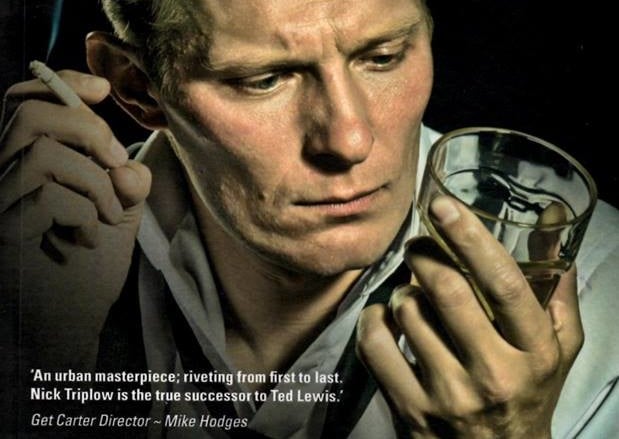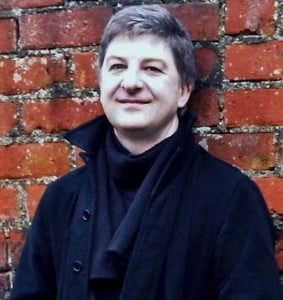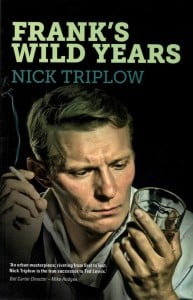
Frank’s Wild Years
Nick Triplow is the author of Frank’s Wild Years, a gritty crime thriller as worthy of the Brit-noir genre as the best of them. The novel follows the titular Frank and barmaid Adeline as they attempt to prevent a mutual friend from falling foul of the dangerously unstable O’Keefe. All the while, they must also try to avoid running up against the seedier aspects of Frank’s former life that have come back to haunt him.
Nick has also won the 2015 Northern Crime Short Story competition with his story Face Value, and has written a number of social history books, including Family Ties, and The Women They Left Behind.
What makes you want to write? When did you start writing?
I started way back when I was about fifteen/ sixteen. It was initially when punk was happening, really, and there were loads of fanzines and stuff that were coming out of it, and that’s what I did. I just started writing, listening to a load of bands like The Clash and The Jam. It was a means of expression, really; often, when you’re at school, and you’re channelled in a certain way, it’s not where you want to be, it’s not what you want to do. So outside of that I was reading a lot, and reading different things and just becoming inspired, at the beginning by a lot of those bands, and just started writing really, really bad poetry. So that’s where it kicked off and just kind of kept going. Over the years, things change, things move around, things happened, and I just stayed with it, really.
How would you say you got from there to writing so much social history?
Well, I think the process, looking back at it, was because I used to read a lot of George Orwell, going way back – and not just the novels, not just the stuff that everybody reads that’s on school services – but I read a lot of his non-fiction; his essays, and things like Homage to Catalonia, and The Road to Wigan Pier. So it was about finding out a lot more about that kind of writing, and seeing how that worked. I was really into, for a while, a lot of the documentary film movement of the nineteen-thirties and forties.
This guy called John Grierson, who worked for the Post Office – the Post Office Film Unit – was making these films. He did one about the mining industry, he did one about the Royal Mail; these things that gave you such an insight into the way the world works, and I’ve always found that fascinating. So that’s really where that interest came from, but also, in a way, the line between fiction and non-fiction: you know, sometimes it’s blurred anyway. When you’re looking at something, when you’re reading something that’s non-fiction there’s an element of artifice, there’s an element of craft in that and the way that’s driven. There’s pure creativity. So there’s not always that kind of hard line between fiction and non-fiction.

Nick Triplow
What was it that made you want to write Frank’s Wild Years? What was it that made you want to switch from social history to a crime-noir novel?
My big love is fiction; that’s what I do really. If someone wanted to look at where my heart is at, it’s in writing stories, and it’s always been that – well, for the last twenty years or so, it’s been about writing fiction. That’s what I’m really aiming to do, so it wasn’t a great leap – the two things were always running in parallel since probably for about the last ten years or so. So there wasn’t a sudden switch between one or the other. Not in my head, anyway; they were all part of the same thing, part of a writing career.
Sometimes people will pay you to write non-fiction, they’ll pay you to write social history, and that’s great, and sometimes you write fiction and you get books published, and that’s great. Also, when you’ve got stories and characters in your head that you’re creating they have to come out somewhere, and you have to find a way to express those, and that’s what Frank was, really. It was a combination of some research but not much, and most of it just came quite naturally. So it was a story that was there that I just needed to be told, really.
Where would you say the inspiration for Frank’s Wild Years came from?
The catalyst was a documentary that was on BBC 2 in 2007 called The Tower, and it was basically a documentary about a housing estate in south London called Pepys Estate that was being knocked down and refurbished. It was quite near where I’m from, in Deptford in south London, and it was going through that process of gentrification – which it still is really, they’re still stomping all over it and building big flats that no one can afford to live in. So there was this documentary that was on, and it was in the back of my head, and one of the episodes was focussed on this local pub, called John Evelyn, and it was a pub that I knew quite well that years ago I’d gone in and taken in stuff that had been taken in by older members of my family.
It was just interesting to see how it was like this last vestige of a kind of working class south London that I had known, and it was clearly going. So that was in the back of my head, and then it was just one night I was listening to Tom Waits, and there’s this song, Tom Traubert’s Blues, I was just listening to it – he writes this great character song, and there’s this character, Frank, who’s referenced in the song – and I just put those two ideas together. What if Frank was this guy sitting at the end of a bar in that pub? It kind of just fell out from there. I say “fell out”; the first chapter just came, I just sat there writing, and kept writing until I had the first chapter about four hours later.
What would you say the biggest problems that you face when writing are?
I think it’s a confidence thing. You’ve got to be able to believe in something for a long time. If you’re writing a novel, some people can write really quickly, but unless you’re already commissioned to do it – unless you know that someone’s going to buy it from you at the end – then you’re writing at risk. You’ve got to believe in it for all that time. It could be a year, it could be eighteen months, and all that time, every day you sit down to write you have to believe that you’re doing the right thing, and that its good writing and that its worth you putting all that time into it, never knowing whether anyone’s going to publish it or be interested in it at the end.
For me that’s the big thing; if you’ve got a massive publishing deal and everything else, then it becomes a different kind of problem, but where I’m at, that’s a big deal because you just never know whether you can sell stuff or not.
 What are you working on currently? Is there anything you’ve got in the works?
What are you working on currently? Is there anything you’ve got in the works?
Yeah, I’m working on quite a few things, actually: I’ve got a follow up novel to Frank’s Wild Years, which is still on the go, and the short story that won the Northern Crime Short Story Competition last year is begging to become something a bit more. I’m working on that, developing the storyline and the characters for that to become a novel at some point – and that’s quite interesting because that was such a departure, really. It was taking a story which was very much set in a specific provincial town, in a small place, and with all the claustrophobia that that implies, so I’m quite interested to pursue that.
But the big thing at the moment, the thing that’s actually getting me up in the morning every day is finishing off a biography of Ted Lewis, the guy who wrote Get Carter, or whose novel Get Carter was based on. That’s been an ongoing project for about eight years to be perfectly honest, and it’s there, it’s pretty much finished, I’m just doing rewrites at the moment.
Who are your favourite contemporary authors? And who are your favourite authors of all time?
At the moment, if you’re talking crime-fiction or genre-fiction, the last couple of things I’ve read and really liked: I liked Cathi Unsworth, she writes these great noir novels. Her novel Without the Moon, which is set during the Second World War, is based on a real serial killer case in London during the Blitz. That’s a great novel.
Ben Myers (and his novel Beastings) is just such a great, brave, out-there-in-the-wilderness stylist, and a great storyteller. I suppose those are the two that I’ve read most recently, but always I’ll go back to people like Gordon Burn, who straddles that line between fiction and non-fiction brilliantly. I like his writing. Graham Greene, again someone who’s writing kind of dates, but it’s never less than really compelling stories.
Locally, I like David Mark. His most recent novel, Dead Pretty, it’s quite a conventional police-procedural, but he does it so well. I could go on for hours listing authors!
Nick Triplow’s first novel “Frank’s Wild Years” was published by Caffeine Nights Publishing in 2012, and is available now. He is currently working on a follow up novel, provisionally titled “The China Hall”. Follow Nick’s blog at www.nicktriplow.blogspot.co.uk, for updates and information from Nick himself.

Comments